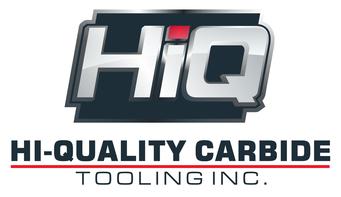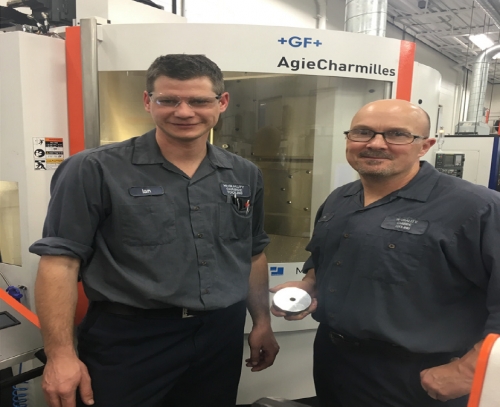Hi-Quality Carbide Tooling Inc., located in Orangeville, Ontario, specializes in small quantities and one-of-a-kind tooling, including carbide extrusion dies, carbide spring-forming tooling and stamping dies, that are used in machines to make mass-produced parts for the automotive, aerospace and medical industries. “One of the dies we make will make two or three million bolts or ball joints for a car,” says Tim Middlehurst, who co-owns Hi- Quality Carbide with Wendy Middlehurst.
“We do lots of bearing work for the oil and gas industry and a lot of aerospace fasteners. And we specialize in spring tools that form shaped wire springs — not just your standard round wire springs.” Hi-Quality was founded in 1980 and now has 15 employees and more than 30 machines, including CNC, ID and manual grinders, wire and sinker EDM, and high-speed milling machines. Hi-Quality Carbide typically deals with small-quantity orders ranging from a single piece to upwards of 20 pieces.
“Everything we do is very specialized,” says Tim. What makes Hi-Quality’s capabilities unique are the hardness and refractory nature of the carbide used in most of the company’s parts. “Carbide is very difficult to work with,” Tim says. For the past five years, Hi-Quality Carbide has used ESPRIT for its wire EDM work, and now the shop uses it for milling and will be transitioning its turning department to ESPRIT in 2018, as well. “We want to have a uniform software across the shop; it’s too confusing switching back and forth between programs,” says Tim.
“We asked our employees which software they preferred. I myself like ESPRIT, and they do, too. For wire EDM, it’s very clear and simple. The way you program the software is exactly what you’d think it would be. It’s really easy to walk yourself through the programming process, and it’s easy to modify existing programs. The post processors that are available for our Sodick and AgieCharmilles machines are extremely accurate; they don’t require any editing. We have the confidence that once we post a job and plug it in, it’s good — which means a lot.”
When Hi-Quality Carbide first implemented ESPRIT for high-speed milling, the software presented them with a challenge. “There was no consistent software available, that we knew of at the time, that could do 3D compensation for high-precision complex forms on our 3D mill,” says Ian Kottelenberg, the shop’s foreman. “That created a very lengthy re-programming process if we wanted to change the size of the part. We worked closely with ESPRIT, with a lot of back-and-forth testing.”
Hi-Quality’s ESPRIT programmer also worked with a Heidenhain expert to come up with the proper math for accomplishing the offset. After re-working and testing the solution many times to ensure success, ESPRIT finally delivered Hi-Quality a solution that worked. “The software is now able to communicate consistently with our machine. Success!” Wendy says. “ESPRIT works every day. It’s a solid system,” Tim says. “The product is very reliable; what works one day will work the next day. That’s sometimes not the case with other software systems.”
Read in PDF

